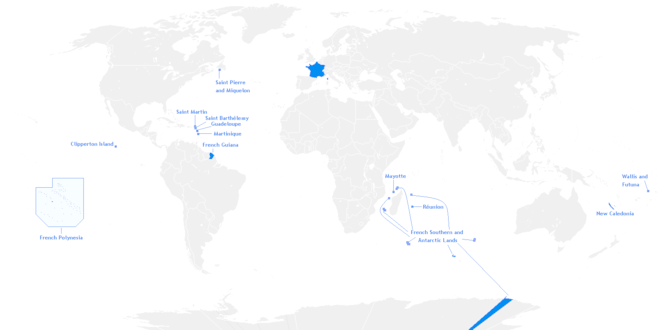Overseas collectivity
The French overseas collectivities (French: collectivité d'outre-mer or COM), like the French regions, are first-order administrative divisions of France, but have a semi-autonomous status. The COMs include some former French overseas colonies and other French overseas entities with a particular status, all of which became COMs by constitutional reform on 28 March 2003. The COMs should not be confused with the overseas regions and overseas departments, which have the same status as mainland France but are just located outside Europe. As integral parts of France, overseas collectivities are represented in the National Assembly, Senate and Economic and Social Council and can vote to elect members of the European Parliament (MEPs). The Pacific COMs use the CFP franc, a currency pegged to the euro, whereas the Atlantic COMs use the euro directly. As of 31 March 2011, there were five COMs:
- French Polynesia became a COM in 2003. Its statutory law of 27 February 2004 gives it the designation of overseas country inside the Republic (French: pays d'outre-mer au sein de la République, or POM), but without legal modification of its status. French Polynesia has a great degree of autonomy, two symbolic manifestations of which are the title of the President of French Polynesia (Le président de la Polynésie française) and its additional designation as a pays d'outre-mer. Legislature: Assembly of French Polynesia since 2004.
- Wallis and Futuna, three small islands in the Pacific Ocean. Has a high administrator and territorial assembly.
- Saint Martin, the northern part of the island of Saint Martin in the Lesser Antilles. St. Martin was separated from the overseas department of Guadeloupe in 2007. It has a territorial council and executive council, and with separation remained a part of the European Union.
- Saint Barthélemy, an island in the Lesser Antilles. St. Barthelemy was separated from the overseas department of Guadeloupe in 2007. It has a territorial council and executive council, and with separation ceased to be part of the European Union.
- Saint Pierre and Miquelon, a group of islands in the Atlantic Ocean off the coast of Newfoundland, Canada. It has a territorial council. It is the last remaining part of New France to be under French rule.
| This article is part of a series on the |
| Administrative divisions of France |
|---|
| Administrative divisions |
| Intercommunality |
| Communes |
| Overseas France |
Former COMs and overseas territories
- Mayotte was a COM from 1976 until 31 March 2011, when it became an overseas department.[1]
- New Caledonia was classified as an overseas territory beginning in 1946, but as a result of the 1998 Nouméa Accord, it gained a special status (statut particulier or statut original) in 1999. A New Caledonian citizenship was established, and a gradual transfer of power from the French state to New Caledonia itself was begun, to last from fifteen to twenty years.
| Overseas collectivity and territory | Capital |
|---|---|
| Papeete | |
| Nouméa | |
| Gustavia | |
| St. Pierre | |
| Mata-Utu |
See also
References
- Benoît Hopquin (31 March 2011). "Mayotte accède à son statut de département dans la confusion". Le Monde. Retrieved 31 March 2011.
External links
- COM – Overseas communities at the far ends of the world – Official French website (in English)
- (in French) Official site
- (in French) past and current developments of France's overseas administrative divisions like collectivités d'outre-mer
